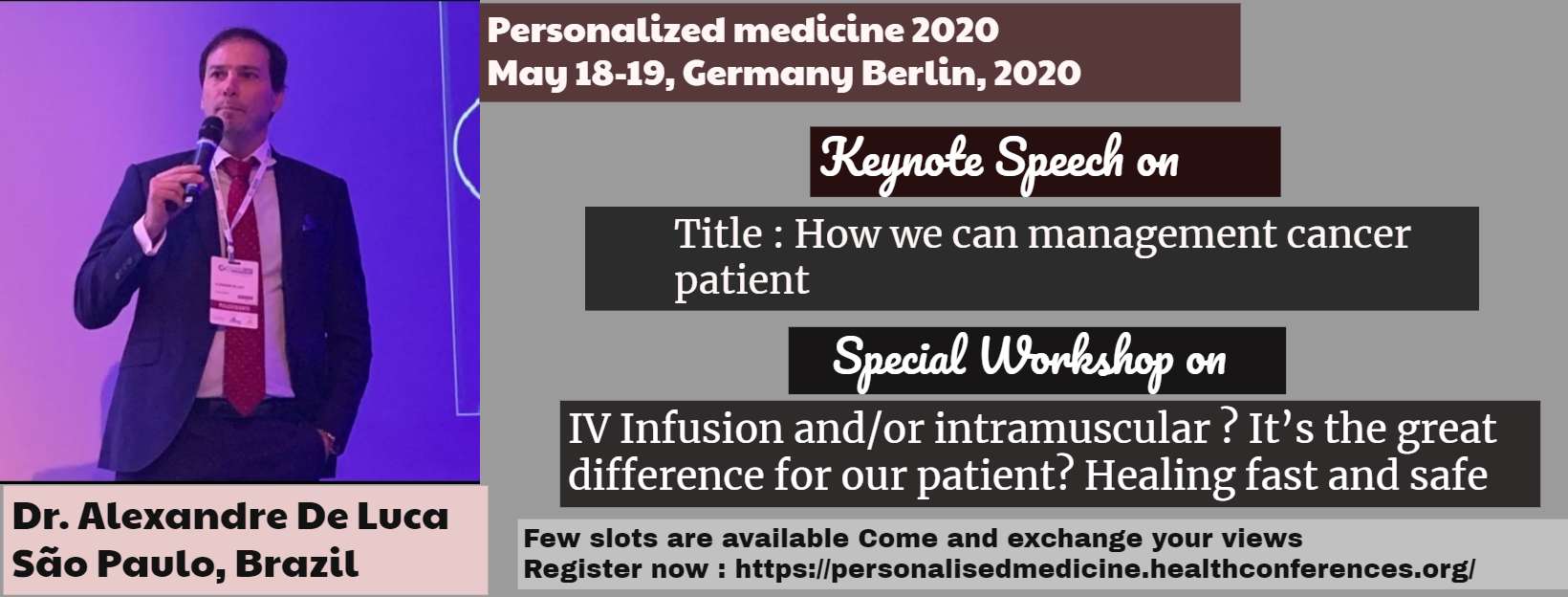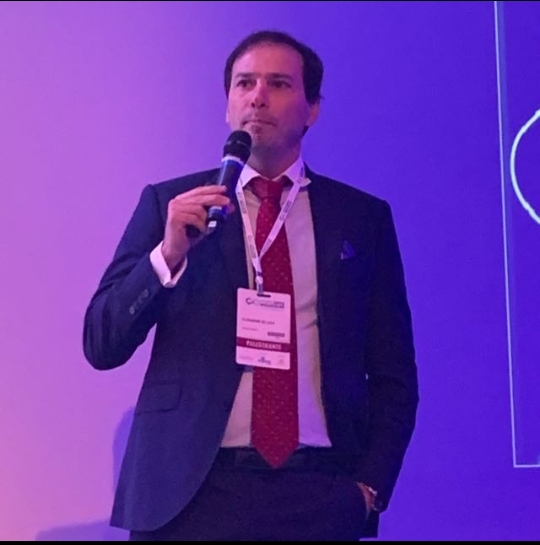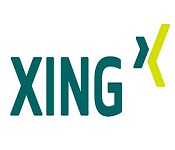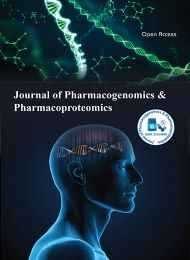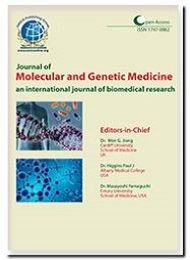
13th World Congress On Personalized Medicine and Novel Therapy

13th World Congress On Personalized Medicine and Novel Therapy

13th World Congress On Personalized Medicine and Novel Therapy

13th World Congress On Personalized Medicine and Novel Therapy

13th World Congress On Personalized Medicine and Novel Therapy

13th World Congress On Personalized Medicine and Novel Therapy May 18-19, 2020 Berlin, Germany Theme: Exploring Innovations and Knowledge on Personalized Medicine.
Theme: Personalized Medicine and Novel Therapy in the time of Covid-19
Personalized Medicine 2020
Conference Series LLC Ltd. is overwhelmed to invite all the participants across the globe to attend “Personalized Medicine and Novel Therapy 2020”
Every person has a unique variation of the human genome. Although most of the variation between individuals has no effect on health, an individual's health stems from genetic variation with behaviours and influences from the environment.
WHAT IT IS?
Preventive Medicine
Preventive healthcare consists of measures taken for disease prevention, as opposed to disease treatment. A medicine or other treatment designed to prevent disease or ill healths. Which are affected by environmental factors, genetic predisposition, disease agents, and lifestyle choices.
Predictive Medicine
The branch of medical science or practice concerned with the prediction of the occurrence or course of disease in individual patients, now especially using genetic information.
Molecular diagnostics
Molecular diagnostics method used to analyse biological markers in the genome and proteome and by applying molecular biology to medical testing. This technique is used to diagnose and monitor disease, detect risk, and decide which therapies will work best for individual patients.
Personalized medicine
Personalized medicine is a medical practice that separates patients into different groups with medical decisions, practices, interventions and products being tailored to the individual patient based on their predicted response and risk of disease.
Personalized Medicine is eluded as individualized treatment which implies the solution of particular medications and therapeutics. Personalized Medicine 2016 highlights the topic "Emphasizing the Knowledge of Personalized Medicine" alongside the logical system clears an approach to assemble visionaries through the exploration talks and presentations. A definitive mission of the meeting is to advance numerous interesting the Novel Approaches and Innovations in customized prescription and social insurance, serves a motivation for the progression of Molecular Diagnostics, a brief talk on Protein Biomarkers, extraordinary spotlight on Genetics Informed Personalized Immunotherapy and Stem Cells Therapy as the Future of Personalized Medicine. Customized Medicine guarantees numerous restorative advancements, and can possibly change the way medications are found and utilized.
ConferenceSeries Ltd is devotedly involved in conducting 300+ ConferenceSeries Ltd Every Year across Europe, USA (Baltimore, Chicago, Las Vegas, Philadelphia, and San Antonio) and almost all other parts of the world with support from 1000 more scientific societies and Publishes 400+ Open access journals which contains over 30000 eminent personalities, reputed scientists as editorial board members.
Personalized medicine therapeutics and companion diagnostic market have huge opportunities for growth in healthcare and will improve therapeutic effectiveness and reduce the severity of adverse effects approach to drug therapies. Personalized cancer medicine is self-made samples of translating cancer genetics into medical. There is a huge contribution of Genomic medicine by revealing genomic variations; have an effect on health, sickness and drug response. Biomarker also play vital role in the biological characteristic which can be molecular, anatomic, physiologic and chemical change drug development research which turns biomarkers into companion diagnostics.
Personalized Medicine and Novel Therapies is a common platform designed for International medical health professionals to facilitate the dissemination and application of research findings related to Personalized Medicine. The Personalized Medicine conference provides a global forum for discussions about new innovations in Novel Therapies to International scientists, researchers, doctors, young students as well as business professionals related to Personalized medicine.
Why to attend??
The Personalized medicine will enlighten the world with recent advances in Personalized medicine and Novel research and inculcate new ideas about Novel health. Moreover, this Personalized medicine Conferences provides the participants a great networking with peers. Internationally prominent speakers, the novel techniques, and the modern updates in the Personalized medicine. Fields are the unique attributes of this conference. Personalized medicine symposiums and Workshops provide a dedicated forum for the advancement, execution and exchange of information about Personalized medicine and Novel Therapies.
Personalized medicine and Novel Therapies is a hallmark in the era of this conferences with its eminent speakers and notable organizing committee members.
Who should attend??
Psychiatrists, Cardiologists, Physicians, Academicians, Academic scientists, Industry professionals, Diagnostic laboratory professionals, Undergraduate & Postgraduate students, researchers, business professionals, Postdoctoral fellows and Trainees, Personalized medicine Associations and Societies.
Conference Series LLC Ltd. which organizes 1000+ Global events every year across USA, Europe & Asia with support from 1000 more scientific Societies and Publishes 700+ Open Access Journals which contains over 50000 eminent personalities, reputed scientists as editorial board members is delighted to welcome all the enthusiastic participants across the world to its prestigious Personalized medicine named ‘Personalized medicine and Novel Therapies Conference.’
Conference Series LLC Ltd. provides an opportunistic environment and vibrant podium through these auspicious events to amplify these steps and meet the highest demand ever, by reflexive connections. Conference Series LLC Ltd has been progressively organizing scientific conferences across the globe, rendezvous which consist of various streams of scientific study to improve and accelerate discovery for a better tomorrow. The non-profit firm plans for organizing an average of 1000 international conferences per year which is supported by 700 open access journals and 80,000 Editorial Board Members. The number of reader views of the website has clocked 7.5 million and still counting. Lately around more than 1000 scientific associations of various fields from all over the world have shown interest in association with Conference Series LLC Ltd. to promote their research work. Conferences Series LLC Ltd offer exciting features like international symposia, B2B meetings, trade shows, exhibitions, and international workshops to build global networking and meaningful academic research and industry alliances. Conference Series LLC Ltd. initiated the 'Young Scientist awards' to the enterprising young science researchers and scholars across the globe.
Personalized Medicine provides an excellent opportunity to share views, exchange knowledge and establish research collaborations & networking.
Personalized Medicine 2020 brings together individuals who have an interest in the field of Psychiatry, Oncologists, Cardiologists, emphysema, Asthma cystic fibrosis, lung cancer, scientists, researchers, doctors, young students as well as business professionals related to Personalized medicine.
Target Audience
- Psychiatrist
- Cardiologists
- Oncologists
- Physiotherapists
- Pulmonologists
- Cancer therapy Institutes
- Endocrinologist
- Neurologist
- Rheumatologist
- Allergist/Immunologist
- Nephrologist
- Emergency Physician
- Ophthalmologist
- Dermatologist
- Scientists
- Directors/Managers
- Pathologists
- Presidents & Vice Presidents/ Directors / Administrators
- Business Entrepreneurs
- COPD Associations/ Societies
- Young Researchers
- Medical Students
- Nurses
- Residents
- Medical Devices Companies
- Palliative care Doctors/Nurses
Track 01: personalized medicine
Personalized medicine, precision medicine, or theranostics is a medical model that separates people into different groups with medical decisions, practices, interventions and/or products being tailored to the individual patient based on their predicted response or risk of disease. The terms personalized medicine, precision medicine, stratified medicine and P4 medicine are used interchangeably to describe this concept[1][2] though some authors and organisations use these expressions separately to indicate particular nuances.
While the tailoring of treatment to patients dates back at least to the time of Hippocrates, the term has risen in usage in recent years given the growth of new diagnostic and informatics approaches that provide understanding of the molecular basis of disease, particularly genomics. This provides a clear evidence base on which to stratify (group) related patients
Track 02: personalized medicine to heart
Research on cardiovascular genetics has had some spectacular successes in uncovering new therapeutic targets—for example, the finding that people with inactivating mutations in the gene encoding the trafficking protein PCSK9 are at a much lower risk for heart attacks led to the development of antibody therapy targeting this protein. However, when it comes to personalizing treatment for cardiovascular disease on the basis of an individual patient's genetic makeup or biomarker data, there are currently only a handful of options where such an approach has proven to be clinically useful.
Track 03: Personalized Immunotherapy
There are currently three major approaches to T cell-based cancer immunotherapy, namely, active vaccination, adoptive cell transfer therapy and immune checkpoint blockade. Recently, this latter approach has demonstrated remarkable clinical benefits, putting cancer immunotherapy under the spotlight. Better understanding of the dynamics of anti-tumour immune responses (the "Cancer-Immunity Cycle") is crucial for the further development of this form of treatment. Tumours employ multiple strategies to escape from anti-tumour immunity, some of which result from the selection of cancer cells with immunosuppressive activity by the process of cancer immunoediting. Apart from this selective process, anti-tumour immune responses can also be inhibited in multiple different ways which vary from patient to patient. This implies that cancer immunotherapy must be personalized to :
(1) identify the rate-limiting steps in any given patient,
(2) identify and combine strategies to overcome these hurdles.
(3) Proceed with the next round of the "Cancer-Immunity Cycle". Cancer cells have genetic alterations which can provide the immune system with targets by which to recognize and eradicate the tumour. Mutated proteins expressed exclusively in cancer cells and recognizable by the immune system are known as neoantigens. The development of next-generation sequencing technology has made it possible to determine the genetic landscape of human cancer and facilitated the utilization of genomic information to identify such candidate neoantigens in individual cancers. Future immunotherapies will need to be personalized in terms of the identification of both patient-specific immunosuppressive mechanisms and target neoantigens
Track 04: Personalized medicine: Drug discovery and patient care.
Advances in human genome research are opening the door to a new paradigm for practising medicine that promises to transform healthcare. Personalized medicine, the use of marker-assisted diagnosis and targeted therapies derived from an individual's molecular profile, will impact the way drugs are developed and medicine is practiced. Knowledge of the molecular basis of disease will lead to novel target identification, toxic genomic markers to screen compounds and improved selection of clinical trial patients, which will fundamentally change the pharmaceutical industry. The traditional linear process of drug discovery and development will be replaced by an integrated and heuristic approach. In addition, patient care will be revolutionized through the use of novel molecular predisposition, screening, diagnostic, prognostic, pharmacogenomics and monitoring markers. Although numerous challenges will need to be met to make personalized medicine a reality, with time, this approach will replace the traditional trial-and-error practice of medicine.
Track 05: Individualized Treatment through Personalized Medicine
This perspective addresses conceptual approaches that can be undertaken to develop and apply clinical decision support in electronic health record systems to achieve personalized medical care. In addition, to represent meaningful benefits to personalized decision-making, a comparison of current and future applications of clinical decision support to enable individualized medical treatment plans is presented. If clinical decision support tools are to impact outcomes in a clear and positive manner, their development and deployment must therefore consider the needs of the providers, including specific practice needs, information workflow, and practice environment.
Track 06: Personalized Medicine in Oncology
The development of cost-effective technologies able to comprehensively assess DNA, RNA, protein, and metabolites in patient tumours has fuelled efforts to tailor medical care. Indeed validated molecular tests assessing tumour tissue or patient germ line DNA already drive therapeutic decision making. However, many theoretical and regulatory challenges must still be overcome before fully realizing the promise of personalized molecular medicine. The masses of data generated by high-throughput technologies are challenging to manage, visualize, and convert to the knowledge required to improve patient outcomes. Systems biology integrates engineering, physics, and mathematical approaches with biologic and medical insights in an iterative process to visualize the interconnected events within a cell that determine how inputs from the environment and the network rewiring that occurs due to the genomic aberrations acquired by patient tumours determines cellular behaviour and patient outcomes. A cross-disciplinary systems biology effort will be necessary to convert the information contained in multidimensional data sets into useful biomarkers that can classify patient tumours by prognosis and response to therapeutic modalities and to identify the drivers of tumour behaviour that are optimal targets for therapy. An understanding of the effects of targeted therapeutics on signalling networks and homeostatic regulatory loops will be necessary to prevent inadvertent effects as well as to develop rational combinatorial
Track 07: Pharmacogenomics & Personalized Medicine
The vision of personalized medicine, the practice of medicine where each patient receives the most appropriate medical treatments and the most fitting dosage and combination of drugs based on his or her genetic make-up, seems to become more realistic as our knowledge about the human genome rapidly expands. We already know the reason for many types of adverse drug reactions, which are often related to polymorphic gene alleles of drug metabolizing enzymes. Moreover, insight into reasons for poor drug efficacy, often related to single nucleotide polymorphisms or larger polymorphisms in genes encoding drug target proteins, has been gained. There is a growing need to incorporate this increasingly complex body of knowledge to the standard curriculum of medical schools, so that the forthcoming generation of clinicians and researchers will be familiar with the latest developments in pharmacogenomics and medical bioinformatics, and will be capable of providing patients with the expected benefits of personalized medicine.
Track 08: Metabolomics in Personalized medicine
The ability of biomarkers to improve treatment and reduce healthcare costs is potentially greater than in any other area of current medical research. For example, the American Society of Clinical Oncology estimates that routinely testing people with colon cancer for mutations in the K-RAS oncogene would save at least US $600 million a years. On the other side, thousands of papers in the course of biomarker discovery projects have been written, but only few clinically useful biomarkers have been successful validated for routine clinical practice The following are the major pitfalls in the translation from biomarker discovery to clinical utility:
1. Lack of making different selections before initiating the discovery phase.
2. Lack in biomarker characterisation/validation strategies.
3. Robustness of analysis techniques used in clinical trials.
Each of these details is rarely documented and can dramatically affect the predictive outcome of biomarker results. However, the selection of useful biomarkers must be carefully assessed and depends on different important parameters, such as on sensitivity (it should correctly identify a high proportion of true positive rate), specificity (it should correctly identify a high proportion of true negative rate), predictive value etc. Unfortunately, biomarkers with ideal specificity and sensitivity are difficult to find. One potential solution is to use the combinatorial power of different biomarkers, each of which alone may not offer satisfaction in specificity or sensitivity.
Track 09: Personalized vaccinology
At the current time, the field of vaccinology remains empirical in many respects. Vaccine development, vaccine immunogenicity, and vaccine efficacy have, for the most part, historically been driven by an empiric "isolate-inactivate-inject" paradigm. In turn, a population-level public health paradigm of "the same dose for everyone for every disease" model has been the normative thinking in regard to prevention of vaccine-preventable infectious diseases. In addition, up until recently, no vaccines had been designed specifically to overcome the immunosenescence of aging, consistent with a post-WWII mentality of developing vaccines and vaccine programs for children. It is now recognized that the current lack of knowledge concerning how immune responses to vaccines are generated is a critical barrier to understanding poor vaccine responses in the elderly and in immunoimmaturity, discovery of new correlates of vaccine immunogenicity (vaccine response biomarkers), and a directed approach to new vaccine development.
Track 10: Precision Medicine and Novel Technology
Precision medicine aims to provide the right treatment for the right patient at the right time with treatment directed on the basis of the targetable tumoral aberrations rather than just a traditional histologic subtype. However to facilitate this approach, clinicians require patient derived samples. Prostate cancer is challenging to culture in vitro. Recent development of novel organoid in vitro culture technology has led to the development of multiple new in vitro prostate cancer cell line models. We aim to apply organoid culture technology to develop novel in vitro prostate cancer cell line models and propagate patient derived samples to allow drug testing and next generation sequencing as part of a precision medicine approach to early recurrent prostate cancer.
Track 11: Individualized Treatment through Personalized Medicine.
Personalized medicine turns this approach on its head. It recognizes that complex diseases should no longer be considered as a single entity. One disease may have many different forms, or ‘subtypes’, resulting from the complex interaction of our biological make-up and the diverse pathological and physiological processes in our bodies. These will not only vary between patients who have the same disease but also within an individual patient as they get older and their body changes. As we integrate and analyses genomic and other data, we can find common factors and causes of variation, resulting in the discovery of new pathways of disease, changing how diseases are thought of and treated. It enables us to recognize that the same underlying change in our DNA or genome can lead to problems in very different parts of the body, which would not have been previously identified with a more traditional care approach.
Track 12: Personalized Medicine: Genomics, Data analysis and Big Data Management
Since the completion of the Human Genome project at the turn of the Century, there has been an unprecedented proliferation of genomic sequence data. A consequence of this is that the medical discoveries of the future will largely depend on our ability to process and analyse large genomic data sets, which continue to expand as the cost of sequencing decreases. Herein, we provide an overview of cloud computing and big data technologies, and discuss how such expertise can be used to deal with biology’s big data sets. In particular, big data technologies such as the Apache Hadoop project, which provides distributed and parallelised data processing and analysis of petabyte (PB) scale data sets, will be discussed, together with an overview of the current usage of Hadoop within the bioinformatics community.
Track 13: Biospecimens as building blocks for Personalized Medicine
Biospecimens contain molecules that can be analysed for indications of diseases. Biospecimens may confirm whether a disease is present or absent in a particular person, and research on biospecimens is especially helpful for understanding more about how disease processes may start and progress. This understanding may lead to better detection of diseases at the earliest stages and may permit design of more effective treatments. Annotated human biospecimens are critical building blocks for precision medicine discovery and essential to the preclinical validation of resulting hypotheses. In this session, learn how advances in technology are improving access to a diverse range of biospecimens from patient populations and yielding increasingly useful amounts of information upon analysis.
1. Human Biospecimens
2. High Quality Bio-banking
3. BioSpecimen Sciences Program
Track 14 : Data science to advance precision medicine
Healthcare and medical research are generating more and more complex data, encompassing clinical investigations, genomic medicine, imaging, pharmacokinetics, metabolomics, epidemiology and beyond. This “Data Science” can form the basis for precision medicine, approaching disease prevention and treatment by taking into account individual variability in genes, environment, and lifestyle. By deeply profiling individual patients and using this to improve predictive models of pathology in individual patients, advances will be made in elucidating of the drivers of the disease and making precise targeted treatments, providing the right treatment to the right patient at the right time. Both biologists and clinicians need to understand this emerging and highly translational approach.
Track 15: Treatment of Genetic Disorders
Gene therapy is hoped to cure or improve treatment of genetic disorders by replacing the mutated or malfunctioned gene, manipulating or turning off the gene causing the disease or stimulate other bodily functions to fight the disease. The most common method is replacement of a malfunctioned or sometimes a missed gene with a healthy one. However, gene therapy poses a risk of potentially serious complications, in the first place due to the method that is used to insert the “new“ genes – the use of viruses. These have the ability to identify certain cells as well as to transmit the genetic material into the cells containing malfunctioned or missed gene. For that reason modified viruses are used as vectors or carriers of the healthy genes. This method of insertion of healthy genes may not seem problematic at a first glance but it can cause potentially serious complications as already mentioned earlier.
Track 16: Market Strategies & Challenges in Personalized Medicine
P4 Medicine is a course of action to significantly upgrade the idea of human life by methods for biotechnology. P4 Medicine is a term created by researcher Leroy Hood, and is another approach to state "Prescient, Preventive, Personalized Medicine, and Molecular Medicine." The reason of P4 Medicine is that, all through the accompanying 20 years, helpful practice will be modified by biotechnology, to manage a man's prosperity, instead of manage a patient's contamination. Internal arrangement or general solution (in Commonwealth nations) is the therapeutic distinguishing strength dealing with the evasion, assurance, and treatment of adult illnesses. Emergency arrangement is a restorative distinguishing strength including watch over adult and paediatric patients with extreme infections or wounds that require speedy remedial thought
Track 17: Approaches to Stem Cells and Cell therapy for Personalized medicine
The inadequacy of existing therapeutic tools together with the paucity of organ donors have always led medical researchers to innovate the current treatment methods or to discover new ways to cure disease. Emergence of cell-based therapies has provided a new framework through which it has given the human world a new hope. Though relatively a new concept, the pace of advancement clearly reveals the significant role that stem cells will ultimately play in the near future. However, there are numerous uncertainties that are prevailing against the present setting of clinical trials related to stem cells: like the best route of cell administration, appropriate dosage, duration and several other applications. A better knowledge of these factors can substantially improve the effectiveness of disease cure or organ repair using this latest therapeutic tool. From a certain perspective, it could be argued that by considering certain proven clinical concepts and experience from synthetic drug system, we could improve the overall efficacy of cell-based therapies. In the past, studies on synthetic drug therapies and their clinical trials have shown that all the aforementioned factors have critical ascendancy over its therapeutic outcomes. Therefore, based on the knowledge gained from synthetic drug delivery systems, we hypothesize that by employing many of the clinical approaches from synthetic drug therapies to this new regenerative therapeutic tool, the efficacy of stem cell-based therapies can also be improved.
The Euro market estimation for customized drugs is anticipated to develop at the exacerbated yearly development rate of 7.5% amid 2009 to 2015. This development in future is required to be driven by various elements such as cost investment funds on medicines, early conclusion of ailment, medication wellbeing, quiet consistence, and improvement of treatments. Right now, America commands the business sector for customized pharmaceutical; be that as it may, progression in innovation and advancements in the field of DNA is required to set up Personalized Medicine Market in USA, UK, France, India, China, and Japan.
Quick advances in innovation have made it attainable to recognize a man's one of a kind genome. One individual varies from another by a large number of varieties in the genome, and a considerable lot of these varieties influence weakness to infection and reaction to medications. More noteworthy comprehension of individual genomes is permitting researchers and clinicians to start to "customize" medication. The Personalized Genomic Medicine insurgency will yield more viable medications with less unfavourable reactions and lead to longer, more beneficial lives and lower human services costs. The customized pharmaceutical industry in the United States as of now produces $286 billion every year in incomes and is developing by 11% every year, as indicated by Price water house Coopers Research at JAX Genomic Medicine will add to customized solution by uncovering how genomic varieties influence wellbeing, malady and medication reaction.
The worldwide Personalized Medicine Industry was esteemed at 8,956.14 billion EUR in 2014 and is relied upon to achieve 2179.32 billion EUR in 2022, developing at a CAGR of 11.8% over the gauge period. Key drivers of the business sector incorporate developing improvement of cutting edge sequencing, entire genome innovation, partner diagnostics and developing number of retail facilities.
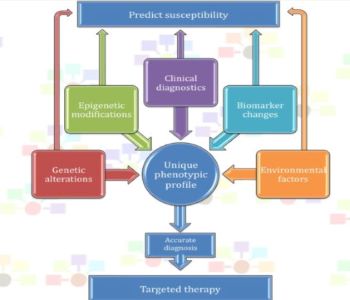
New Zealand has internationally recognized strengths in health research. With these strengths, we can contribute to the international scientific endeavor, address local problems and make the best use of knowledge generated offshore. Dedicated investment in health research in New Zealand gives us the capacity we need to generate innovative ideas, tap into global science and effectively translate research findings into policy and practice in the health, disability, social and science sectors. Health research is central to New Zealand’s national innovation system. The Government, the tertiary education sector, the health sector and private enterprise all have particular roles in making it successful. This strategy provides the foundation for the health sector to play a leading role in health research and innovation. The sector’s contribution will help realize the benefits from our investments in health research and make the most of the wealth of knowledge and evidence generated offshore.
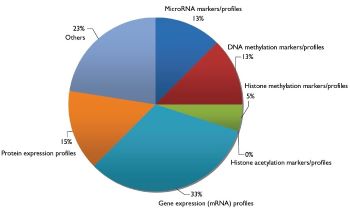
The inadequacy of existing therapeutic tools together with the paucity of organ donors have always led medical researchers to innovate the current treatment methods or to discover new ways to cure disease. Emergence of cell-based therapies has provided a new framework through which it has given the human world a new hope. Though relatively a new concept, the pace of advancement clearly reveals the significant role that stem cells will ultimately play in the near future. However, there are numerous uncertainties that are prevailing against the present setting of clinical trials related to stem cells: like the best route of cell administration, appropriate dosage, duration and several other applications. A better knowledge of these factors can substantially improve the effectiveness of disease cure or organ repair using this latest therapeutic tool. From a certain perspective, it could be argued that by considering certain proven clinical concepts and experience from synthetic drug system, we could improve the overall efficacy of cell-based therapies
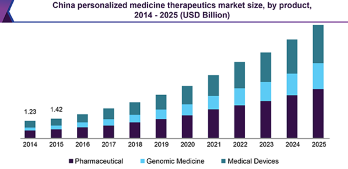
This generates a strong impetus for scaling up the CDx tests to form Personalised Medicine for non-oncology cases. Increasing prevalence of cancer, which boosts demand for personalized cancer diagnostics and therapeutics, is also one of the key factors responsible for the growth of the market. As per data GLOBOCAN 2018, the global burden of cancer has increased to 18.1 million new cases in 2018. Growing cancer-related spending is also amongst the drivers for growth. Key companies in the personalized medicine market are involved in several investment programs pertaining to the precision medicine. This has resulted in an increased commitment of leading pharma competitors toward this sector. Furthermore, companies providing molecular decision support system are combining genomic data with clinical data to minimize the gaps in precision medicine practice.
Personalized Medicine Congress 2019
We had successfully hosted the “11th World Congress on Precision and Personalized Medicine” during August 14-15, 2019 at Auckland, New Zealand. The conference focused on the theme “Therapeutic approaches and New diagnostic technologies to Personalized Medicine”. The conference was successful in bringing together renowned speakers from various reputed organizations and their paramount talks enlightened the gathering.
The idealistic meet organized by our management received generous response from the academia & young student community. Researchers and students who attended from different parts of the world made their valuable contribution to make it a successful event. The conference was marked with the presence of eminent Speakers, Young Researchers, Students & Delegates driving the event into the path of success with thought provoking keynote& plenary presentations.
The Conference focused on recent developments in the diabetes sector and the meeting engrossed in knowledgeable discussions on novel subjects like:
- Precision Medicine
- Precision Medicine and Novel Technology
- Future of personalized medicine
- Individualized Treatment Through Personalized Medicine
- Precision Pathology
- Predictive Biomarkers
- Precision Medicine: Oncology
- Data science to advance precision medicine
- Preventive Medicine
- Cardiovascular medicine
- Precision Immunotherapy
- Pharmacogenomics & Personalized Medicine
- Approaches to Stem Cells and Cell therapy
- Biospecimens as building blocks for Precision Medicine
- Personalized Health Care Delivery
- Treatment of Genetic Disorders
- Personalized Vaccinology
- Market Strategies & Challenges in Personalized Medicine
- Metabolomics in precision medicine
- Precision Medicine: Genomics, Data analysis and Big Data Management
- Precision Medicine and Diagnostics Development
- Drug Discovery and Development
Special Session:
Title: Holistic Healthcare for Gracious Aging
Goh Chye Tee, NTU Chinese Medicine Clinic, School of Biological Science, Nanyang Technological University, Singapore
Title: Personalized and Precision Medicine as the Healthcare Model to be Set Up and to Secure the Boiosefty
Sergey Suchkov, Moscow Engineering Physical Institute (MEPhl), Russia.
Title: Integrative Maternity HealthCare- The only logical way forward
Kathy Fray, MotherWise & IIMHCO (International Integrative Maternity HealthCare Organization)
Hima Challa, K and H Personalized Medicine Clinic, India
Title: Drinking to Remember! Cognitive, Neurophysiological and Mood Effect of Rosemary Warter
Mark Moss, Department of Psychology, Northumbria University, UK
Title: The Dawning Era of PPM Exposing a Gap in Medical Education to be Secured by the Creative Approach in Growing Up Medical Doctors as Creative Medical Artists of the New Generation: From Canonical Integrity Through a Bridge of the Challenge to the Multi-Integrative Approach
Sergey Suchkov, Moscow Engineering Physical Institue (MEPhl), Russia
Title: Integrating Personalized Genomics into Diabetes Management
Pleayo Tovaranonte, Precision Medicine International Limited, New Zealand
Title: Polphenol rich herbak congee, “MP”, enhance attention, working memory and bone formation markers but decreases bone resorption markers
Jintanaporn Wattanathorn, Khon Kaen University, Khon Kaen, Thailand
Title: A FHIR based questionnaire tool for patient reported outcome
C N L Beutter, MOLIT Institute for Personalized Medicine gGmbH, Germany
The proceedings of the conference were embarked with an opening ceremony followed by Special sessions and a series of Lectures delivered by both Honorable Guests and members of the Keynote forum. The adepts who promulgated the theme with their exquisite talks were:
· Goh Chye Tee, Nanyang Technological University, Singapore
· Sergey Suchkov, Moscow Engineering Physical Institute (MEPhl), Russia
· Kathy Fray, MotherWise & IIMHCO (International Integrative Maternity HealthCare Organization)
· Hima Challa, K and H Personalized Medicine Clinic, India
· Mark Moss, Department of Psychology, Northumbria University, UK
· Sergey Suchkov, Moscow Engineering Physical Institue (MEPhl), Russia
· Pleayo Tovaranonte, Precision Medicine International Limited, New Zealand
· Jintanaporn Wattanathorn, Khon Kaen University, Khon Kaen, Thailand
· C N L Beutter, MOLIT Institute for Personalized Medicine gGmbH, Germany
We extend our heartiest thanks to all the Organizing Committee Members for their kind support rendered towards the success of Personalized Medicine Congress 2019. At the same time we take the opportunity to thank all the speakers, delegates and participants for providing their valuable contribution and time for Personalized Medicine Congress 2019.
Personalized Medicine 2019 Organizing Committee would like to thank the Moderator of the conference, Sergey Suchkov who contributed a lot for the smooth functioning of this event.
With the encouragement from the excellent feedback from the participants and supporters of Personalized Medicine 2019, Conference Series LLC is glad to announce “13th World Congress on Precision and Personalized Medicine” in 2020.
Conference Highlights
- Personalized Palliative care
- Precision Medicine: Genomics, Data analysis and Big Data Management
- Drug Target Discovery and Integration
- Personalized Medicine & its Innovations
- Nanotechnology in Personalized Medicine
- Personalized Biological Therapies
- Personalized Medicine in Oncology
- Treatment of Genetic Disorders
- Preventive Medicine & Public Health Care
- Proteomics and Genomics in Personalized Medicine
- Personalized Management of Infectious Diseases
- Personalized Management of Pulmonary Disorders
- Personalised Management of Genetic Disoders
- Personalized Management of Immune Disorders
- Personalized in Healthcare
- Personalized Non-Pharmacological Therapies
- Ethics of Personalized Medicine
- Regulatory of Personalized Medicine
- Economics of Personalized Medicine
- Future of Personalized Medicine
- Personalized medicine for Diabetes
- Family Medicine
- Palliative Care in Symptom Management
- Personalized Medicine for Clinical Neurology and Neurosurgery
- Ortho Medicine
- Emergency medicine
- Dental Public Health
- Personalized medicine for Gastroenterology
To share your views and research, please click here to register for the Conference.
To Collaborate Scientific Professionals around the World
| Conference Date | May 18-18, 2020 | ||
| Sponsors & Exhibitors |
|
||
| Speaker Opportunity Closed | Day 1 | ||
| Poster Opportunity Closed | Click Here to View | ||
Useful Links
Special Issues
All accepted abstracts will be published in respective Our International Journals.
- Journal of Clinical & Medical Genomics
- Journal of community medicine and Health Education
- Journal of Molecular and Genetic Medicine
Abstracts will be provided with Digital Object Identifier by


